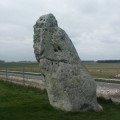Who Will Move the Stone?
A long time ago, there lived a king who took great pleasure in teaching his people good habits. "Bad luck comes only to the lazy and careless," said he, "but to the busy workers come the good things of this life!" One night he put a large stone in the middle of the road near his palace and then watched to see what the people who passed that way would do. Early in the morning an old farmer came along with his heavy wagon laden with corn. "Oh, those lazy people!" he said, driving his wagon to one side of the road. "Here is this big stone right in the middle of the road, and nobody will take the trouble to move it." And he went on his way, talking about the laziness of other people, but never thinking of touching the stone himself.
Then came a young soldier, singing a song as he walked along. A feather was stuck in his hat, and a big sword hung at his side; and he was fond of telling great stories of what he had done in the war. He held his head so high that he did not see the stone, but stumbled over it and fell flat in the dust.
This put an end to his song; and, as he got to his feet, he began to criticize the country's people. He said, "How silly to leave a stone like that in the middle of the road!" Then he passed on, but he did not sing any more.
An hour later there came down the road six merchants with their goods on pack-horses, going to a fair that was to be held near the village. When they reached the stone, the road was so narrow that they could hardly drive their horses between it and the wall. "Did anyone ever see the like?" they said. "There is that big stone in the road, and everyone in the country is too lazy to move it!" And so the stone lay there for three weeks! It was in everybody's way, and yet everybody left it for somebody else to move. Then the king sent word to all his people to meet together near his palace, as he had something to tell them.
The day came, and a great crowd of men and women gathered in the road. The farmer was there, and so were the merchants and the young soldier. "I hope the king will now find out what a lazy set of people he has round him," said the farmer. The sound of a horn was heard, and the king was seen coming towards them. He rode up to the stone, got down from the horse, and said, "My friends, it was I who put this stone here three weeks ago. It has been seen by every one of you, and yet every one of you has left it just where it was and scolded the others for not moving it out of the way." Then he stooped down and rolled the stone over. Underneath the stone was a round, hollow place, in which was a small iron box. The king held up the box so that all the people might see what was written on the piece of paper fastened to it. These were the words: "For him who lifts the stone." He opened the box, tuned it upside down, and out fell a beautiful gold ring and twenty gold coins! Then every one of them wished that he had moved the stone, instead of going round it and finding fault with other people.
There are many people who still think it easier to find fault than to do the work which lies before them.

